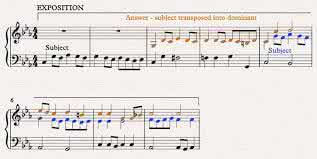fugue
US /fjuːɡ/
UK /fjuːɡ/

名词
1.
赋格曲
a contrapuntal compositional technique in two or more voices, built on a subject (theme) that is introduced at the beginning in imitation and which recurs frequently in the course of the composition.
示例:
•
Bach's 'Toccata and Fugue in D minor' is a masterpiece of classical music.
巴赫的《D小调触技曲与赋格》是古典音乐的杰作。
•
The composer skillfully wove multiple melodic lines into a complex fugue.
作曲家巧妙地将多条旋律线编织成一首复杂的赋格曲。
2.
神游症, 分离性神游
a state or period of loss of awareness of one's identity, often coupled with flight from one's usual environment, associated with certain forms of hysteria and epilepsy.
示例:
•
After the traumatic event, the patient experienced a dissociative fugue, wandering far from home.
创伤事件后,患者出现了分离性神游症,离家出走。
•
The doctor diagnosed him with a psychological fugue state.
医生诊断他患有心理神游症。
在 Lingoland 学习这个单词